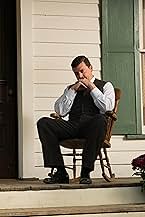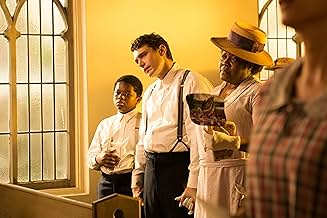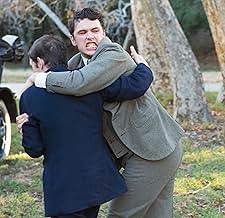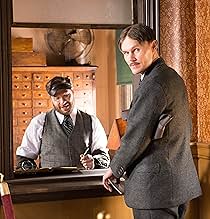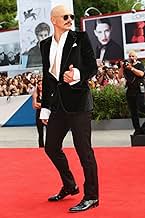AVALIAÇÃO DA IMDb
4,9/10
1,3 mil
SUA AVALIAÇÃO
Um olhar sobre as provações e tribulações da família Compson, que viveu no Sul durante o início do século XX.Um olhar sobre as provações e tribulações da família Compson, que viveu no Sul durante o início do século XX.Um olhar sobre as provações e tribulações da família Compson, que viveu no Sul durante o início do século XX.
- Direção
- Roteiristas
- Artistas
- Direção
- Roteiristas
- Elenco e equipe completos
- Produção, bilheteria e muito mais no IMDbPro
Avaliações em destaque
I watched this on netflix, expecting it to be ridiculous. It turned out to be a credit to Franco's seriousness and ambition. The tone was right, the pacing was right, the visual language was right, and I thought three of the principle characterizations were fantastic (Jason III, Quentin the son, and Jason IV). Actually I liked the Dalton Ames and Cady and Luster. And the Mother too. Anyway, I accepted from the beginning that a movie adaptation of TSTF is a huge challenge - it's a book I know pretty well, and I imagine anyone who sees this movie without having read TSTF a few times would wonder WTF?
So hats off to James Franco. He's such a hottie that I don't think people give him credit for serious work. Here's it's deserved.
Filming ordinary books is easy; it's the stuff of the film business. Filming one of the greatest English language novels of the 20th century is really hard. Really hard.
The script is a worthy and very creditable effort which makes concessions to film and audience comprehensions; something Faulkner flouted when he forced readers to deal with the opening sixty pages of this remarkable book.
The telling is true enough, it keeps to the thread of the stories; the compromises between book and film are understandable; the portrayals are strong and the director has Faulkner's echo to work with. It is a solid entry to the book and no doubt it will be the thing students use instead of reading it.
The question is whether it works in its own right and that is more problematic because if one comes to the film via the book the comparisons are interminable. If a viewer sees it as is they could quibble with its purpose and narrative, still atypical, especially in these conventional times.
The essential quality of Faulkner's prose is effaced; it has to be as the camera replaces the text, and that is a huge loss for multifarious reasons, in particular the extreme subjectivity which must be diluted through the objective lens.
Even so, the film is admirable for its talent and effort; nor does it waste the viewer's attention.
The script is a worthy and very creditable effort which makes concessions to film and audience comprehensions; something Faulkner flouted when he forced readers to deal with the opening sixty pages of this remarkable book.
The telling is true enough, it keeps to the thread of the stories; the compromises between book and film are understandable; the portrayals are strong and the director has Faulkner's echo to work with. It is a solid entry to the book and no doubt it will be the thing students use instead of reading it.
The question is whether it works in its own right and that is more problematic because if one comes to the film via the book the comparisons are interminable. If a viewer sees it as is they could quibble with its purpose and narrative, still atypical, especially in these conventional times.
The essential quality of Faulkner's prose is effaced; it has to be as the camera replaces the text, and that is a huge loss for multifarious reasons, in particular the extreme subjectivity which must be diluted through the objective lens.
Even so, the film is admirable for its talent and effort; nor does it waste the viewer's attention.
I've never been able to make it through this Faulkner novel, but anyone who is able to cipher through the notoriously confusing The Sound and the Fury and write a coherent screenplay should be congratulated. I think the only reason this movie was panned was because it was James Franco's baby, and very few of his movies were well-liked by the critics. Had someone else put his name on the film, directed it and starred as the mentally retarded Benji, the film probably would have been touted and given dozens of nominations throughout the awards season. Instead, it was criticized as being a failure and given the terrible insult of "it's hard to fault him for trying."
This heavy, upsetting drama follows a Southern family in the 1920s; crowned by patriarch Tim Blake Nelson, the four siblings have immense problems and struggle to face their existence. Split into four sections, each section is filmed with a different touch and tone. Experimenting with light, framing, and point of view, each segment clearly describes what the different characters are going through and how they look at life. Had anyone else directed this movie, with the same result, I really believe the talent behind the camera would have been praised.
The first section is from James Franco's point of view, so everything is handheld, wild, and confused. One image leads to a memory, which leads to another memory, and when brought back to the present moment, both Franco and the audience are briefly disoriented. Franco's character is mentally retarded, and as simple pleasures calm him down momentarily, the slightest upset can change his mood. He loves his sister, who was the only one to defend him when they were little, but his obsession with finding reminders of her gets him into trouble. He's always assigned a guardian to walk with him and try to manage his moods, but since his "keepers" begrudge the duty and treat him terribly, he absorbs their negative energy. He can hear conversations about sending him away to an asylum, he can tell when people are insulting him, and on some level, he knows he's unable to express himself or communicate better than an animal.
The second section shows Jacob Loeb's troubles as he deals with his immense emotional problems, as well as his incestuous relationship with his sister. It doesn't seem possible for anything to be more disturbing than the first segment, but watching people with mental problems who don't have Franco's excuse is really disturbing. The third section cements the pattern: Ahna O'Reilly has a profound and damaging impact on all three of her brothers' lives. Both Franco and Loeb get into permanent trouble as they seek different versions of her love, and Scott Haze is left to pick up the pieces of her irresponsible mistake. She leaves behind an illegitimate child and Scott has to put his entire life on hold while he raises his niece. He's supposed to be a villain, but as the best villains can make the audience understand them, his frustration is completely relatable. He's left cleaning up everyone else's messes, and he's forced to watch history repeat itself with the next generation. He becomes the new patriarch, patronizing his mother and putting up with his brother, and the young daughter of the family gets into trouble and disrespects propriety and family order. When he loses his temper with Joey King's rebellious behavior, you feel like joining him. Everything gets wrapped up with a brief fourth section following Loretta Devine, a family servant who has known the siblings since childhood. I'm sure I'm not alone in wishing this segment was longer, since Loretta's such a pro and isn't given as much screen time to show her talent, but with the heavy subject matter of the past ninety minutes, it's understandable that the movie took pity on its audience and ended quickly.
The performances in The Sound and the Fury are mind-blowing. You know the feeling you get when you see a stage play with incredible actors who bounce emotions off each other so perfectly there's a tangible hum in the air? You'll get the same feeling when you watch this movie. Each cast member seems so set in his or her role, it'll be nearly impossible to see them in other movies and believe they can play other characters. Not a single emotion of James Franco's wordless performance hints to the audience, "Look how great an actor I am!" He's not pretending to be mentally retarded and completely out of touch with his surroundings; he actually is. If you've never seen in his earlier heartthrob films, you won't really be able to appreciate the depth of his transformation. And if anyone else had given that performance, he probably would have gotten an Oscar nomination out of it. If you can get yourself in the mood for a heavy Southern drama that makes Tennessee Williams's plays seem like screwball comedies, rent James Franco's highly underrated The Sound and the Fury.
DLM Warning: If you suffer from vertigo or dizzy spells, like my mom does, this movie might not be your friend. The entire first section and a couple of scenes in the second section are filmed with a handheld camera, and that will make you sick. In other words, "Don't Look, Mom!"
Kiddy Warning: Obviously, you have control over your own children. However, due to sexual content, I wouldn't let my kids watch it.
This heavy, upsetting drama follows a Southern family in the 1920s; crowned by patriarch Tim Blake Nelson, the four siblings have immense problems and struggle to face their existence. Split into four sections, each section is filmed with a different touch and tone. Experimenting with light, framing, and point of view, each segment clearly describes what the different characters are going through and how they look at life. Had anyone else directed this movie, with the same result, I really believe the talent behind the camera would have been praised.
The first section is from James Franco's point of view, so everything is handheld, wild, and confused. One image leads to a memory, which leads to another memory, and when brought back to the present moment, both Franco and the audience are briefly disoriented. Franco's character is mentally retarded, and as simple pleasures calm him down momentarily, the slightest upset can change his mood. He loves his sister, who was the only one to defend him when they were little, but his obsession with finding reminders of her gets him into trouble. He's always assigned a guardian to walk with him and try to manage his moods, but since his "keepers" begrudge the duty and treat him terribly, he absorbs their negative energy. He can hear conversations about sending him away to an asylum, he can tell when people are insulting him, and on some level, he knows he's unable to express himself or communicate better than an animal.
The second section shows Jacob Loeb's troubles as he deals with his immense emotional problems, as well as his incestuous relationship with his sister. It doesn't seem possible for anything to be more disturbing than the first segment, but watching people with mental problems who don't have Franco's excuse is really disturbing. The third section cements the pattern: Ahna O'Reilly has a profound and damaging impact on all three of her brothers' lives. Both Franco and Loeb get into permanent trouble as they seek different versions of her love, and Scott Haze is left to pick up the pieces of her irresponsible mistake. She leaves behind an illegitimate child and Scott has to put his entire life on hold while he raises his niece. He's supposed to be a villain, but as the best villains can make the audience understand them, his frustration is completely relatable. He's left cleaning up everyone else's messes, and he's forced to watch history repeat itself with the next generation. He becomes the new patriarch, patronizing his mother and putting up with his brother, and the young daughter of the family gets into trouble and disrespects propriety and family order. When he loses his temper with Joey King's rebellious behavior, you feel like joining him. Everything gets wrapped up with a brief fourth section following Loretta Devine, a family servant who has known the siblings since childhood. I'm sure I'm not alone in wishing this segment was longer, since Loretta's such a pro and isn't given as much screen time to show her talent, but with the heavy subject matter of the past ninety minutes, it's understandable that the movie took pity on its audience and ended quickly.
The performances in The Sound and the Fury are mind-blowing. You know the feeling you get when you see a stage play with incredible actors who bounce emotions off each other so perfectly there's a tangible hum in the air? You'll get the same feeling when you watch this movie. Each cast member seems so set in his or her role, it'll be nearly impossible to see them in other movies and believe they can play other characters. Not a single emotion of James Franco's wordless performance hints to the audience, "Look how great an actor I am!" He's not pretending to be mentally retarded and completely out of touch with his surroundings; he actually is. If you've never seen in his earlier heartthrob films, you won't really be able to appreciate the depth of his transformation. And if anyone else had given that performance, he probably would have gotten an Oscar nomination out of it. If you can get yourself in the mood for a heavy Southern drama that makes Tennessee Williams's plays seem like screwball comedies, rent James Franco's highly underrated The Sound and the Fury.
DLM Warning: If you suffer from vertigo or dizzy spells, like my mom does, this movie might not be your friend. The entire first section and a couple of scenes in the second section are filmed with a handheld camera, and that will make you sick. In other words, "Don't Look, Mom!"
Kiddy Warning: Obviously, you have control over your own children. However, due to sexual content, I wouldn't let my kids watch it.
I'm not a big fan of Faulkner and always found his stories to be somewhat overemotional and difficult to understand, but I was captivated by this movie interpretation. There is a lot that is not explained as the action unfolds, and the order of events barely follow a chronological sequence, which can make it difficult for those who expect a more traditional mode of story telling. It almost felt like the images were being laid over each other, like thin paint that is applied and then allowed to dry so the colors and textures can be built up.
The acting is quite phenomenal throughout, and there's a high level of energy maintained as this confusing story circumvents about, serving as nothing more than the memoir of a family and the extreme emotional dependencies they inflict upon one another. The relentless and intense interactions are performed in a nearly senseless fashion, which I believe emulates the family's feelings of futility as they plummet through to their pathetic end.
Often, there was a mysterious musical track that almost sounded like the dull drone of a plane flying overhead, a very good way to bind the action together. If the music were more intense or melodramatic the movie could come across as sappy and ridiculous. As it is, the confusion and disparity could turn off even the most ardent viewer, but I found the experience rewarding on a number of subtle levels one might find in films by the likes of Ingmar Bergman.
The acting is quite phenomenal throughout, and there's a high level of energy maintained as this confusing story circumvents about, serving as nothing more than the memoir of a family and the extreme emotional dependencies they inflict upon one another. The relentless and intense interactions are performed in a nearly senseless fashion, which I believe emulates the family's feelings of futility as they plummet through to their pathetic end.
Often, there was a mysterious musical track that almost sounded like the dull drone of a plane flying overhead, a very good way to bind the action together. If the music were more intense or melodramatic the movie could come across as sappy and ridiculous. As it is, the confusion and disparity could turn off even the most ardent viewer, but I found the experience rewarding on a number of subtle levels one might find in films by the likes of Ingmar Bergman.
I was a huge fan of Franco's earlier Faulkner adaptation, "As I Lay Dying," so I checked this one out even though I wasn't aware of it's existence until just recently.
As with his earlier Faulkner adaptation, it's extremely difficult to understand. This is mainly because Faulkner's original book, The Sound and the Fury, is equally difficult. You can read the book, or watch the movie, and easily have no idea what it's about. This is the nature of the beast with Faulkner, and as I get older I start to wonder if he ever meant these stories to make sense. I'm leaning towards no, but I don't think it really matters as his stories aren't about coherence, they're more about emotion and pondering this strange existence we all seem to be stuck in, not logic or reason as perhaps is hinted at by Mr. Compson's nihilistic boozy monologues.
I don't envy the task of making The Sound and the Fury into a movie, but I think it was done about as perfectly as could be expected when you're talking about one of the most disjointed, out of time, and at times rambling and incoherent stories ever told.
I only have one major complaint, in that the black servants of the Compson family are barely depicted in the film. In the book they're much bigger characters and form a sort of moral, and even hopeful element to the story, as is somewhat hinted by the movie scene of the church choir.
A few other plot points are changed, to no real harm. The final thing that struck me was that Franco's adaptation has a slightly different ending, which doesn't really make any sense. Of course, the original book ending doesn't make any more sense...not that it should. We are, of course, all living a story told by an idiot.
As with his earlier Faulkner adaptation, it's extremely difficult to understand. This is mainly because Faulkner's original book, The Sound and the Fury, is equally difficult. You can read the book, or watch the movie, and easily have no idea what it's about. This is the nature of the beast with Faulkner, and as I get older I start to wonder if he ever meant these stories to make sense. I'm leaning towards no, but I don't think it really matters as his stories aren't about coherence, they're more about emotion and pondering this strange existence we all seem to be stuck in, not logic or reason as perhaps is hinted at by Mr. Compson's nihilistic boozy monologues.
I don't envy the task of making The Sound and the Fury into a movie, but I think it was done about as perfectly as could be expected when you're talking about one of the most disjointed, out of time, and at times rambling and incoherent stories ever told.
I only have one major complaint, in that the black servants of the Compson family are barely depicted in the film. In the book they're much bigger characters and form a sort of moral, and even hopeful element to the story, as is somewhat hinted by the movie scene of the church choir.
A few other plot points are changed, to no real harm. The final thing that struck me was that Franco's adaptation has a slightly different ending, which doesn't really make any sense. Of course, the original book ending doesn't make any more sense...not that it should. We are, of course, all living a story told by an idiot.
Você sabia?
- CuriosidadesJames Franco and Seth Rogen also appeared together in Freaks & Geeks (1999), Ligeiramente Grávidos (2007), Segurando as Pontas (2008), O Besouro Verde (2011), É o Fim (2013), A Entrevista (2014), Sexo, Drogas e Jingle Bells (2015), Festa da Salsicha (2016), Artista do Desastre (2017), and Zeroville: A Vida em Hollywood (2019).
- ConexõesReferenced in Showreel: Ol' MacDonald Had a Show (2013)
Principais escolhas
Faça login para avaliar e ver a lista de recomendações personalizadas
- How long is The Sound and the Fury?Fornecido pela Alexa
Detalhes
- Data de lançamento
- País de origem
- Idioma
- Também conhecido como
- The Sound and the Fury
- Locações de filme
- Empresas de produção
- Consulte mais créditos da empresa na IMDbPro
- Tempo de duração1 hora 41 minutos
- Cor
- Proporção
- 16:9 HD
Contribua para esta página
Sugerir uma alteração ou adicionar conteúdo ausente

Principal brecha
By what name was O Som e a Fúria (2014) officially released in India in English?
Responda

